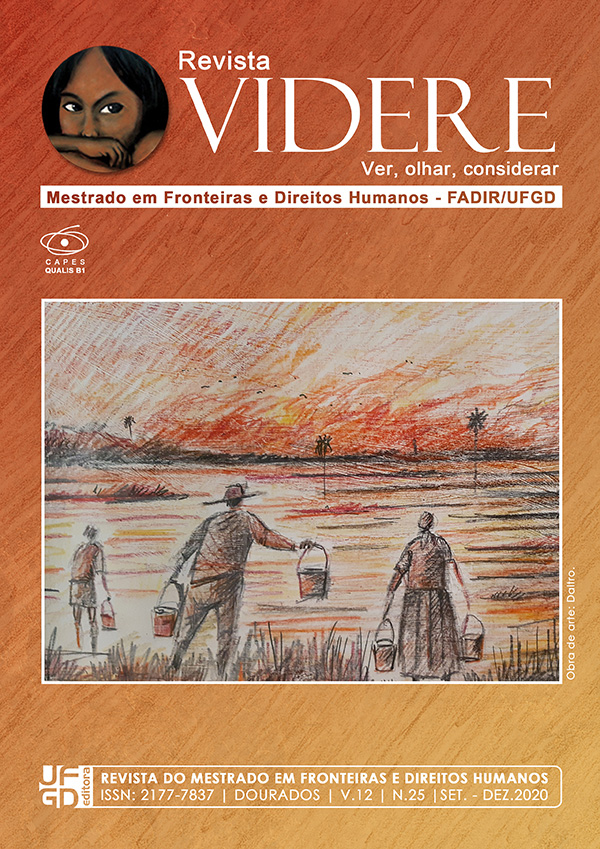The exercise of reproductive citizenship obtained by the irreflection and the balanity of evil, from the thought of Hannah Arendt
DOI:
https://doi.org/10.30612/videre.v12i25.12857Keywords:
Banality of evil. Thoughtlessness. Reproductive citizenship. Human rights.Abstract
The aim of this article is to analyze the exercise of reproductive citizenship based on Hannah Arendt's concept of thoughtlessness and the consequent banality of evil. In fact, it is intended, through this study, to make a comparison between Arendtian observations on the irrational way of simply obeying orders and following a predetermined code of ethics, without reflecting on the conduct taken, leading to the banality of poorly described by the philosopher at the time of Eichmann's judgment, with the medical practices that make artificial reproduction, at any cost, mowing the reproductive citizenship from those who are involved in the act.
Downloads
References
AGAMBEN, Giorgio. Homo Sacer: o poder soberano e vida nua I. Tradução Henrique Burigo, 2. ed. Belo Horizonte: Editora UFMG, 2010, p. 164-166.
ANDRADE, Marcelo. A banalidade do mal e as possibilidades da educação moral: contribuições arendtianas. Rev. Bras. Educ., Rio de Janeiro, v. 15, n. 43, p. 109-125, Apr. 2010. Disponível em: http://www.scielo.br/scielo.php?script=sci_arttext&pid=S1413-24782010000100008&lng=en&nrm=iso. Acesso em: 11 Set. 2020
ARENDT, Hannah. Homens em tempos sombrios. São Paulo: Companhia de Bolso; 2008.
ARENDT, Hannah. Compreender: formação, exílio e totalitarismo. Belo Horizonte (BH): Companhia das Letras/Editora UFMG; 2008.
ARENDT, Hannah. A vida do espírito. Rio de Janeiro (RJ): Civilização Brasileira: 2009.
ARENDT, Hannah. Origens do totalitarismo. São Paulo: Companhia das Letras; 1998.
ARENDT, Hannah. Sobre a violência. Rio de Janeiro: Civilização Brasileira; 2009.
ARENDT, Hannah. A condição humana. Rio de Janeiro: Editora Forense; 2007.
ARENDT, Hannah. Eichmann em Jerusalém. Um relato sobre a banalidade do mal. Tradução de José Rubens Siqueira. São Paulo: Companhia das Letras, 1999A.
ÁVILA, Maria Betânia de Melo. Modernidade e cidadania reprodutiva. In: ÁVILA, Maria Betânia de Melo; BERQUÓ, Elza. Direitos reprodutivos: uma questão de cidadania. Brasília: Centro Feminista de Estudos e Assessoria - CFEMEA, 1994.
AVILA, Maria Betânia de Melo. Direitos sexuais e reprodutivos: desafios para as políticas de saúde. Cad. Saúde Pública, Rio de Janeiro, v. 19, supl. 2, p. S465-S469, 2003. Disponível em: http://www.scielo.br/scielo.php?script=sci_arttext&pid=S0102-311X2003000800027&lng=en&nrm=iso. Acesso em 17 de Junho de 2020.
BIGNOTTO, Newton. & MORAES, Eduardo Jardim. Hannah Arendt – diálogos, reflexões e memórias. Belo Horizonte: UFMG, 2003, p.138.
BOURDIEU, Pierre. O poder simbólico. 2. ed. Rio de Janeiro: Bertrand Brasil, 1998.
CHAVES, Rosângela. A capacidade de julgar. Um diálogo com Hannah Arendt. Goiânia. Canone Editorial, 2009.
EDITORIAL, Coordenação. Manifesto por uma convenção interamericana dos direitos sexuais e dos direitos reprodutivos. Revista Estudos Feministas, Florianópolis, v. 15, n. 1, jan. 2007. ISSN 1806-9584. Disponível em: https://periodicos.ufsc.br/index.php/ref/article/view/7749. Acesso em: 26 ago. 2020.
HAGUE CONFERENCE ON PRIVATE INTERNATIONAL LAW. A Preliminary Report On The Issues Arising From International Surrogacy Arrangements. 2012. Disponível em: https://assets.hcch.net/docs/d4ff8ecd-f747-46da-86c3-61074e9b17fe.pdf. Acesso em: 10 Fev. 2020.
MADGE V (2014) Gestational surrogacy in India: the problem of technology and poverty. In: DasGupta S and Dasgupta SD (eds) (2014) Globalization and Transnational Surrogacy in India: Outsourcing life. Lanham, MD: Lexington Books, pp. 45–66.
MATOS, OC. O Storyteller e o Flâneur: Hannah Arendt e Walter Benjamim. In: Moraes EJ, Bignotto N. Belo Horizonte (BH): Companhia das Letras/Editora UFMG; 2003.
SMIETANA, Marcin. Procreative consciousness in a global market: gay men'spaths to surrogacy in the USA. Symposium -Making Families. Reproductive Biomedicine and Society Online, Vol. 7, Nov. 2018. Disponível em: https://www.ncbi.nlm.nih.gov/pmc/articles/PMC6465560/. Acesso em: 27 Ago. 2020
SOUKI, N. Hannah Arendt e a banalidade do mal. Belo Horizonte (BH): Editora UFMG; 1998.
Downloads
Published
How to Cite
Issue
Section
License
Authors must accept the publication rules when submitting the journal, as well as agree to the following terms:
(a) The Editorial Board reserves the right to make changes to the Portuguese language in the originals to maintain the cultured standard of the language, while respecting the style of the authors.
(b) Authors retain the copyright and grant the journal the right to first publication, with the work simultaneously licensed under the Attribution-NonCommercial-ShareAlike 3.0 Brazil (CC BY-NC-SA 3.0 BR) that allows: Share - copy and redistribute the material in any medium or format and Adapt - remix, transform, and create from the material. CC BY-NC-SA 3.0 BR considers the following terms:
- Attribution - You must give the appropriate credit, provide a link to the license and indicate whether changes have been made. You must do so under any reasonable circumstances, but in no way that would suggest that the licensor supports you or your use.
- NonCommercial - You may not use the material for commercial purposes.
- Sharing - If you remix, transform, or create from material, you must distribute your contributions under the same license as the original.
- No additional restrictions - You may not apply legal terms or technological measures that legally restrict others from doing anything that the license permits.
(c) After publication, authors are allowed and encouraged to publish and distribute their work online - in institutional repositories, personal page, social network or other scientific dissemination sites, as long as the publication is not for commercial purposes.



















